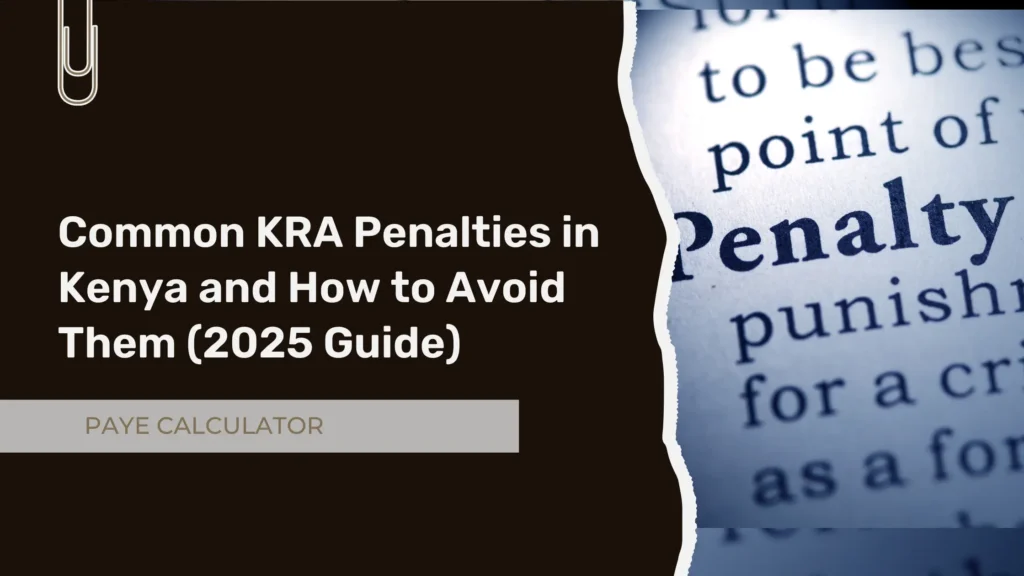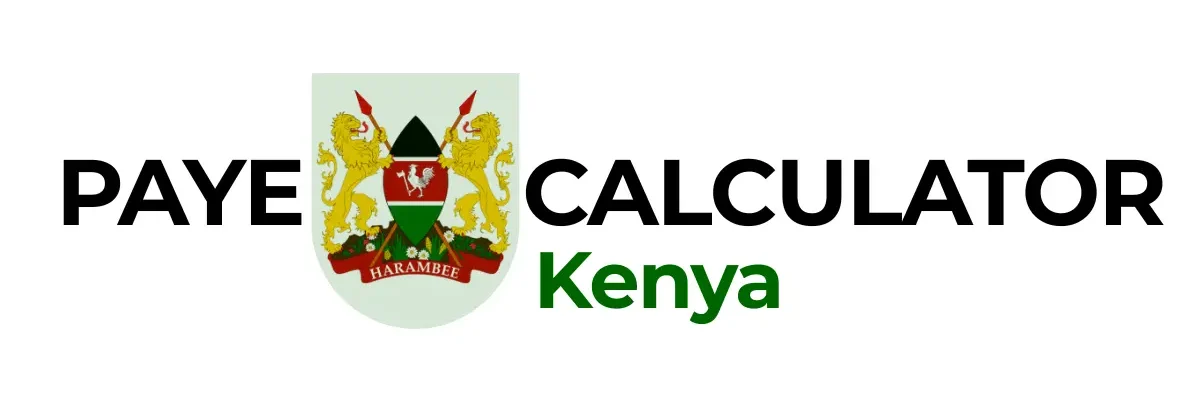Common KRA Penalties in Kenya and How to Avoid Them (2025 Guide)
Every year, thousands of Kenyans face unexpected fines and penalties from the Kenya Revenue Authority (KRA) due to simple tax mistakes. Whether it’s forgetting to file your return on time, under-declaring income, or failing to remit PAYE for your employees, these errors can result in costly penalties.

In 2025, KRA has continued to tighten its digital compliance systems through the iTax platform, making it easier to detect delays, mismatches, or non-compliance. Understanding the different types of KRA penalties in Kenya and how to avoid them can save individuals and businesses a lot of money and stress.
This article breaks down the most common KRA penalties, their amounts, and practical steps to stay compliant.
Why KRA Imposes Penalties
The Kenya Revenue Authority (KRA) enforces penalties to ensure compliance with tax laws. These penalties encourage timely filing, accurate reporting, and proper recordkeeping. They also help maintain a fair system where everyone pays their share of taxes.
If taxpayers delay filing or underpay their dues, the government’s revenue flow is affected. Hence, KRA uses penalties and interest as a deterrent against negligence or deliberate tax evasion.
Common Types of KRA Penalties in Kenya (2025)
Below are the most frequent penalties every taxpayer should be aware of in 2025:
1. Late Filing of Tax Returns
If you fail to file your tax return by the deadline, KRA automatically applies a late filing penalty.
For individual taxpayers:
- Penalty: KSh 2,000 or 5% of the tax due (whichever is higher).
For companies:
- Penalty: KSh 20,000 or 5% of the tax due (whichever is higher).
Example:
If a company with KSh 100,000 in taxes due files one month late, the penalty will be 5% of 100,000 = KSh 5,000. However, since the minimum is KSh 20,000, that becomes the applicable penalty.
Avoidance Tip:
Always mark the annual filing deadlines — June 30 for individual returns and six months after the accounting period for companies. File early on iTax even if you have no income (nil returns).
2. Late Payment of Taxes
Even if you file your return on time, you can still incur penalties if you delay payment.
Penalty: 5% of the tax due plus 1% interest per month on the unpaid amount.
Example:
If you owe KSh 50,000 and pay one month late, you’ll be charged:
- 5% penalty = KSh 2,500
- 1% monthly interest = KSh 500
Total extra cost: KSh 3,000.
Avoidance Tip:
Always pay taxes immediately after filing your return. Use KRA Pay Bill Number 572572 and the correct payment registration number (PRN) from your iTax portal.
3. Late PAYE Remittance (For Employers)
PAYE (Pay As You Earn) must be remitted by the 9th of every following month. Late payment attracts severe penalties.
Penalty: 25% of the amount due or KSh 10,000, whichever is higher.
Example:
If an employer fails to remit KSh 40,000 PAYE, the penalty is:
25% of 40,000 = KSh 10,000.
Since both amounts are equal, the penalty remains KSh 10,000.
Avoidance Tip:
Always calculate PAYE accurately using the current year’s tax bands. Tools like Payecalculatorkenya.pro provide instant PAYE calculations and compliance guidance.
4. Failure to Deduct PAYE
If an employer fails to deduct PAYE from employees’ salaries, KRA imposes a penalty as if the tax had been deducted and not remitted.
Penalty: Equal to the amount that should have been deducted plus interest at 1% per month.
Avoidance Tip:
Ensure all employees are registered with KRA and have valid PINs. Always cross-check payroll deductions before processing salaries.
5. Late VAT Filing and Payment
Registered businesses must file VAT returns monthly by the 20th of the following month.
Penalties for non-compliance:
- Late filing: KSh 10,000 or 5% of the tax due (whichever is higher).
- Late payment: 5% of the amount due plus 1% interest per month.
Avoidance Tip:
Use KRA’s iTax reminders and calendar tools to track deadlines. File VAT returns even when there are no sales to avoid nil filing penalties.
6. Withholding Tax Penalties
If you fail to withhold tax or fail to remit it to KRA on time, the penalties can be significant.
Penalty: 10% of the amount not deducted or remitted, with a minimum of KSh 10,000.
Avoidance Tip:
Always confirm whether your suppliers, consultants, or contractors are subject to withholding tax. Remit withheld amounts by the 20th of the following month.
7. Failure to Keep Proper Records
KRA requires all businesses to maintain accurate financial and tax records for at least five years.
Penalty: KSh 100,000 or imprisonment for up to six months, or both.
Avoidance Tip:
Maintain all invoices, receipts, payrolls, and bank statements. Digitize your records for easy access during audits.
8. Failure to Register for a KRA PIN
Any person conducting business or earning taxable income in Kenya must have a KRA PIN.
Penalty: KRA can deny services such as business registration, vehicle transfers, or tax refunds. In some cases, fines of up to KSh 100,000 may apply.
Avoidance Tip:
Register for a KRA PIN immediately through the iTax platform at https://itax.kra.go.ke.
9. Misdeclaration or Underreporting of Income
Providing false information or underreporting income to pay less tax is a serious offense.
Penalty: 75% of the tax underpaid, plus interest. In severe cases, criminal prosecution applies.
Avoidance Tip:
Always declare all income sources — employment, business, rent, and investment. Keep proper receipts and use certified accountants for tax filing.
10. Non-Compliance with Electronic Tax Invoice Management System (eTIMS)
In 2025, KRA made it mandatory for all VAT-registered businesses to issue electronic tax invoices through eTIMS.
Penalty: KSh 1 million or 10% of the transaction value, whichever is higher, for non-compliance.
Avoidance Tip:
Ensure your business is connected to eTIMS. You can register via KRA’s website and integrate your POS or accounting software.
Summary of Common KRA Penalties
| Type of Offense | Penalty |
|---|---|
| Late return filing (Individual) | KSh 2,000 or 5% of tax due |
| Late return filing (Company) | KSh 20,000 or 5% of tax due |
| Late tax payment | 5% penalty + 1% monthly interest |
| Late PAYE remittance | 25% of tax or KSh 10,000 (whichever is higher) |
| Late VAT filing | KSh 10,000 or 5% of tax due |
| Failure to deduct PAYE | 100% of amount + 1% monthly interest |
| Withholding tax not remitted | 10% of tax or KSh 10,000 minimum |
| Failure to keep records | KSh 100,000 or 6 months imprisonment |
| False income declaration | 75% of underpaid tax |
| eTIMS non-compliance | KSh 1 million or 10% of transaction value |
How to Avoid KRA Penalties
Avoiding penalties is simple once you build a routine of compliance. Here’s how:
- File Returns on Time:
Always file on or before the due date, even if it’s a nil return. - Use the iTax Platform Regularly:
Log in frequently to check for notices or pending returns. - Keep Updated Records:
Maintain soft and hard copies of all receipts and payments. - Hire a Qualified Accountant or Tax Consultant:
Professionals help ensure accuracy and compliance with changing tax laws. - Set Payment Reminders:
Use calendar alerts to remind you of KRA deadlines for VAT, PAYE, and Income Tax. - Automate Payroll and Accounting:
Use online tools like Payecalculatorkenya.pro to calculate PAYE, NHIF, and NSSF deductions correctly. - Stay Updated with KRA News:
Follow KRA’s official channels for policy updates and new compliance rules.
What to Do If You Already Have a Penalty
If you’ve received a penalty from KRA, don’t panic. You can resolve it through the following steps:
- Log in to the iTax Portal:
Go to https://itax.kra.go.ke and check the specific penalty type. - Confirm the Reason:
Identify whether it’s due to late filing, payment delay, or system error. - Make the Payment:
Generate a payment slip and pay via M-Pesa Pay Bill 572572 using your PRN. - Appeal if Necessary:
If you believe the penalty is unfair, submit an objection letter with supporting documents through your iTax account. - Avoid Future Mistakes:
Implement internal tracking systems to ensure timely compliance going forward.
Conclusion
Understanding KRA penalties in Kenya is essential for every taxpayer. The Kenya Revenue Authority continues to modernize its systems and enforce compliance through automation and data tracking. By filing returns on time, keeping proper records, and using accurate tools for payroll and tax calculations, you can completely avoid unnecessary fines.
Tax compliance is not just about avoiding penalties — it’s about building a culture of accountability and supporting national development. As we move through 2025, staying compliant ensures financial peace of mind for both individuals and businesses.
